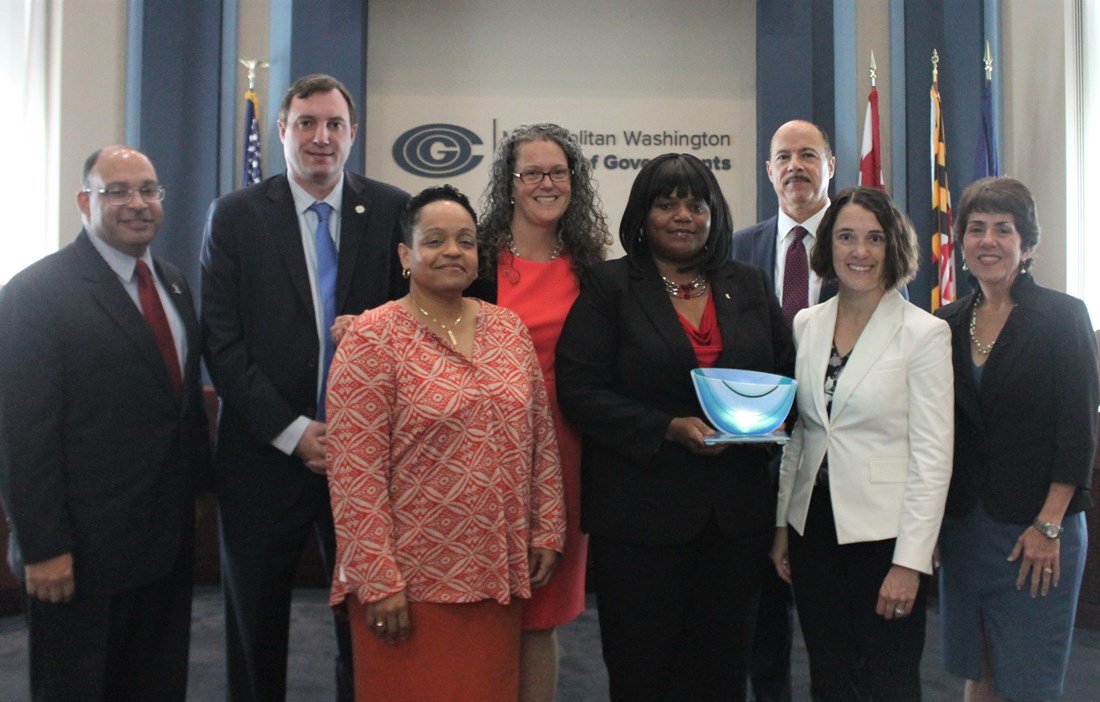The Metropolitan Washington Council of Governments (COG) presented the Climate and Energy Leadership Awards to the Prince George’s County Sustainable Energy Program, GRID Alternatives Mid-Atlantic, and the Georgetown Climate Center for outstanding efforts to reduce greenhouse gas emissions, increase energy efficiency, and advance regional goals established by leaders at COG.
The awards were distributed Wednesday at the October COG Board of Directors Meeting by its Chairman, Loudoun County Supervisor Matt Letourneau, COG Climate, Energy, and Environment Policy Committee Chair and Prince George’s County Council Member Mary Lehman, and COG’s Air and Climate Public Advisory Committee (ACPAC) Chair Dr. Gretchen Goldman. The awards were handcrafted by Montgomery County artist Janet Wittenburg, owner of Glass Habitat studio.
“The program this year sought to recognize environmental programs that showed outstanding efforts to reduce greenhouse gas emissions and promoted equitable community engagement,” said Lehman in her remarks. “We’re so excited to see how this amazing work continues to help the region meet its climate and energy goals.”
Learn more about the award recipients and their innovative programs below:
Prince George’s County Sustainable Energy Program

The Prince George’s County, Office of Central Services, Sustainable Energy Program and its partners offer a comprehensive set of energy solutions that enhance quality of life and maximize energy savings in the communities it serves. Initiatives include the Transforming Neighborhoods Initiative (TNI) Clean Energy Grant, ENERGY STAR Certification & Green Leasing Grant; Sustainable Energy Workforce training; Green Energy Loan fund; and an energy literacy effort with Prince George’s County Public Schools. Many of these initiatives address the needs of underserved communities and support the county’s economic development priorities. Prince George’s County is the number one producer of solar energy generation in metropolitan Washington and has reduced greenhouse gas emissions (GHG) by 12 percent since 2005. This year, the county government completed the installation of its largest solar canopy system at the Wayne K. Curry Administration Building in Largo, Maryland. The system generates about 1 MW of clean solar energy, enough electricity to power around 70 average size homes.
GRID Alternatives Mid-Atlantic

GRID Alternatives Mid-Atlantic develops and implements solar projects that serve qualifying households and affordable housing providers while offering solar education and hands-on job training to help people jumpstart their solar careers. GRID Alternatives Mid-Atlantic was awarded $950,000 from the District Department of Energy and the Environment (DOEE) and the Department of Employment Services (DOES) to implement the first year of Solar Works DC, a low-income solar installation and hands-on solar job training program for DC residents. GRID Alternatives Mid-Atlantic has completed three Solar Works DC cohorts. Trainees are DC residents, predominately from underserved communities, and represent a variety of ages, backgrounds, and experiences. 21 cohort graduates are now employed in the solar industry. The cohorts have supported 55 solar installations at no cost to homeowners, who are income-qualified from underserved communities in DC. Together, these families will save an estimated $835,900 on their electricity bills over the solar systems’ lifetime and prevent 5,425 tons of greenhouse gas emissions.
Georgetown Climate Center

Georgetown Climate Center (GCC), in partnership with the District Department of Energy and Environment (DOEE), conducted a year-long community engagement process in the neighborhoods surrounding the Watts Branch Tributary of the Anacostia River. The project sought to create an inclusive and empowering process where residents living in the climate-vulnerable parts of the District could self-determine a vision for a resilient and sustainable community. The project relied on an “Equity Advisory Group” (EAG) of thirteen residents who were chosen to be demographically representative of the community. The EAG provided recommendations around the implementation of the District’s Climate Ready DC plan and the Clean Energy DC plan. The group considered how the District could equitably implement and build resilience hubs serving Ward 7, and shape a green workforce development program. This initiative reached a population of residents who may not have otherwise engaged on these topics.
MORE: About the Climate and Energy Leadership Awards